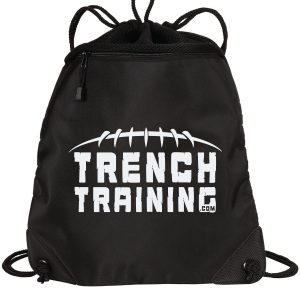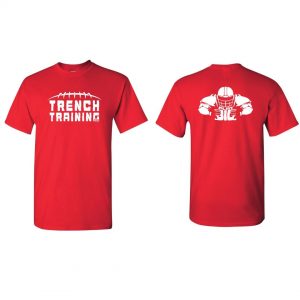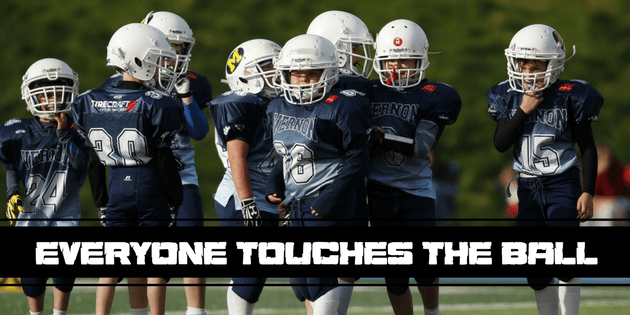
by Steve Stark | Apr 2, 2018 | Blog, coaching kids, youth football
When you’re a big kid playing youth football everyone expects that you are going be a natural. However, many times, these big kids have no idea how to use that big body. And so, they get yelled at for being soft and often put on the line to never touch the ball.
What makes football fun for young kids?
Fun = getting to touch the ball in a game.
Just play. Have Fun. Enjoy the game. – Michael Jordan
Last year my 3rd grade son, Jacob, played flag football for the our local park and rec. 3rd and 4th graders are certainly a challenging age but I thought the coaches did a good job with the kids. They taught fundamentals at every position and were very patient with the kids.
There was however one thing that I found extremely frustrating. Only about half the kids on the team got to play positions where they handled the ball.
My son is a big kid. Twice the size of some of his teammates. Because he’s so big and growing so fast he’s also not real coordinated. He may be destined to play with his hand down some day. But it doesn’t have to be in 3rd and 4th grade flag football.
Flag football will be the only opportunity that Jacob and other big kids like him will have a chance to touch the ball. When our kids start playing tackle football there are weight limits on who can and cannot touch the ball. As a 3rd-grader, Jacob is already too big to carry the ball in our 5th grade tackle program.
Each week he came home after practice and said he wished he could play quarterback. I would ask if he gets to practice playing quarterback or running back or receiver… nope. He got super excited just to play center because he got to touch the ball in a game.
Jacob said football was fun. But I could tell it wasn’t that much fun. It wouldn’t have been for me if I was 9 and playing right guard and defensive tackle all season.
If we want to keep kids like Jacob in the game of football, then we need to make sure they are having fun. Not just in practice but in games as well. That means giving them the ball a couple times throughout the year in an actual game.
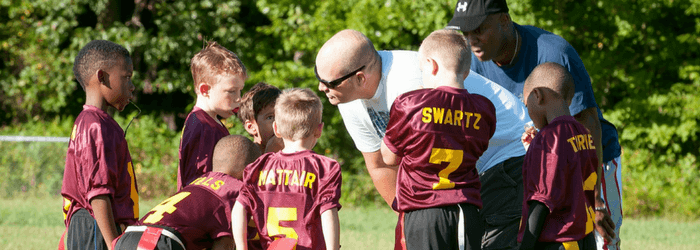
This past season I decided to coach my son’s 3rd and 4th grade flag football. Needless to say, it is a challenging age to coach in any sport but it was a lot of fun. My number one goal was to make sure that every kid on the team had the chance to play every position in an actual game.
Every kid played quarterback, running back, wide receiver, tight end, defensive back, linebacker and of course positions on both the offensive and defensive lines.
Did we win every game? Not so much. But all the kids had fun.
Jacob got to play quarterback and it was probably the most fun he’s had playing a sport. Jacob threw for a 2-point conversion and his buddy (2nd biggest kid on our team) ran for a touchdown. With no speed between the two big boys, we actually won that game. Go figure.
We played teams that had the same kids in the same positions for the entire season. Their best players of course were at the quarterback and running back positions. They won a lot of games. I wonder though, how many kids did they lose from the game? How many of those kids that never touched the ball will want to come back and play next season?
Is winning worth losing kids from our game? It isn’t. It NEVER is.
Who Cares About Winning?
Who cares about winning 3rd & 4th grade flag football championships? Do the kids really care that much?
I can tell you, without a doubt, they don’t. They care about being with their friends. They care about going for ice cream after the game. They care about having fun.
Parents care about 3rd & 4th grade championships. It’s difficult. We, as parents, want the best for our kids. We want them to win at everything. There’s nothing wrong with that. But we need to realize that there are consequences when all we care about is winning.
Now don’t get me wrong. I am as competitive as any person you will ever meet. I want to win. I want my kids to win.
My goal is to keep my kids active in team sports and to learn the fundamentals of the game. I will always encourage my kids to play team sports.
All the encouragement in the world won’t matter if they don’t enjoy playing.
We need to make sure we put fun and learning first at the youth level and winning second.
Who Do Kids Want To Be?
Do 9-year-olds dream of being an offensive lineman? No.
Kids are not sitting around on Sundays watching offensive linemen make plays. Kids watch the NFL and see players like Odell Beckham and Tom Brady and they want to be those players. They dream about making the same plays that those players make every Sunday.
When they play pick-up games at recess or in the backyard, they want to score touchdowns. We need them to keep dreaming like that. Just because they’re big doesn’t mean we should discourage those dreams.
Kids develop very differently and today’s big lineman may be tomorrow’s all-star quarterback or tight end.
Let them PLAY and DREAM.
For Jacob, next year the pads go on. I know he’s excited. He’ll have to play on the line because of his size and I hope his coaches will work to make it a fun experience.
Football is a game. It has to be fun. And we have to do everything we can to make it fun for our kids.
Have you had a similar experience with your youth football player? Let us know. Be sure to comment and share this article.
Let’s spread the word about making youth football about fun and not just winning.
Play BIG!
Coach Steve
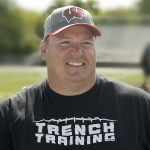

by Steve Stark | Jan 17, 2017 | Blog, coaching kids, player development
This time of year we see a lot of coaching changes in football.
Losing a coach can be devastating and learning to live with a new coach can be even more difficult.
One of the most difficult coaching changes for me came right before my senior year in college.
My position coach left the University of Wisconsin to coach for the Philadelphia Eagles.
At the time… I was crushed.
And honestly, a little scared.
In college, your position coach is often your most trusted mentor.
They know you better than anyone.
For me, Coach Callahan was the reason I got a chance to play.
He was a tough coach.
However, his attention to detail and demand for technical excellence fit me and my personality.
I needed someone to be the demanding perfectionist.
It’s what allowed me to grow and thrive in college football.
It all turned out okay with the new offensive line coach.
However, I always wonder what I missed out on without him there my senior year.
I also remember the things I learned having to adjust to a new coach.
He was also a great coach too, he just had a different style.
What I had to do was get over the loss and move on.
I realized that experiencing a new point of view can be very beneficial.
In the end it made me a better player and a far better coach.
Let’s look at some tips to handling coaching changes.
Tips to Handling Coaching Changes
When a Coach Leaves…
Understand their reason for leaving.
It’s not just players that dream of being successful.
Coaches, especially position coaches, may have aspirations to be coordinators or head coaches.
When opportunities for advancement come along, coaches have to look out for themselves and their families.
This is their career and their livelihood.
Most coaches will let their players know why they are leaving and try to explain their situation.
Be sure to look at it from their perspective and not just your own.
Wish them well.
When you have a coach for several years (in my case it was 4 years), you create a relationship.
Just like the guys you play with become family, often a coach does as well.
It’s not just hard on the player.
Coaches struggle with this change as well.
Their players become very special to them and it’s a difficult decision to leave.
Wish them well and let them know what they have meant to you.
Try to stay in touch.
It’s crazy how the world works sometimes.
NEVER burn a bridge.
The relationships you create in football can last a lifetime.
You never know when your paths will cross again.
Maybe on another team in the future.
Maybe in business.
Maybe just in the craziness of our lives.
However it happens try to stay in touch.
Your coach will appreciate it and you can continue to learn from your mentor for years to come.
When a New Coach Arrives…
Be open to their coaching.
Every coach is different.
The style in which they run practice, call plays and talk to players will vary.
You need to have an open mind to these changes.
Coaches do things a certain way for a reason.
Often times it’s because they’ve had success that way.
Embrace the change and get behind it.
Communicate.
You have to have good communication to have a good relationship.
Talk to your coach.
If you don’t understand something ask.
However, don’t preach about how things used to be.
Move on and figure out what your new coach is looking for.
Be a leader.
This is your chance to step forward and lead.
Show you new coach that you wan to be a leader.
You do that by setting an example.
Be positive and rally your teammates to get behind the new coach.
Nothing destroys a team quicker than a divided locker room.
Step up and be a leader.
If you you found value with today’s post please like, comment and share.
Play Big!

Coach Steve

by Steve Stark | Jan 3, 2017 | Blog, coaching kids, player development
This time of year we all think about what our goals are for the new year.
We also reflect on the previous year.
Unfortunately we often dwell too long on our failures instead of building on our successes.
While it’s good t reflect on the previous year, you have to keep your focus forward.
As we look at our goals for the new year I want you to ask yourself these 5 questions.
5 Questions for Goal Setting Success
1. Are your goals really yours?
You might be asking yourself, “Who the heck’s goals would they be?”
Well… we often do what we think we are expected to do and not always what’s important to us.
Don’t let others dictate your goals.
Search your feelings, Luke. (The new Star Wars movie was awesome.)
But seriously, be sure that you are going after the things YOU are passionate about.
2. Are your goals meaningful?
This question goes hand-in-hand with the question above.
Your goals have to excite you.
If you aren’t excited about achieving your goals then you won’t achieve them.
Goals need to mean something to you.
Something powerful that’s going to keep you working when you don’t feel like working.
They also have to be relevant to your success.
What are the things you need to improve?
What goals can you set to make sure you make those improvements?
Not sure?
Talk to your coach.
Have them help you figure out where you need to improve your game and the goals you can set for this year.
3. Are your goals realistic?
If you are currently running a 5.8 second 40 yard dash, setting a goal to run a 4.6 second 40 in 3 months is probably not realistic.
I don’t want to tell anyone what they can and can’t accomplish.
However, having unrealistic and unattainable goals will not help you succeed.
Set your goals high but allow yourself realistic time to achieve them.
Look at the successful players that came before you.
How do you stack up to the standard that they set.
Let that be a guide for your goal setting.
Again, your coach can help you set realistic and attainable goals.
4. Do your goals challenge you?
On the other end of the spectrum you need to make sure that you are challenged by the goals you set.
It does you no good to set goals that you can easily achieve.
You need to find that balance.
Set goals that require you to stretch to your limits.
Set goals that are just beyond your grasp.
When you achieve them, set new ones that are again just beyond your reach.
This makes me think of one of my favorite quotes.
What are you willing to do to achieve your goals?
Are you willing to learn new things and work harder than you ever have before?
You’ll have to if you want to reach challenging goals.
5. Are your goals specific and measurable?
You need to be very specific about what your goals.
What exactly do you want to achieve and by what date?
Don’t just say, “I want to lose weight this year”, or “I want to get stronger this year.”
Write down an exact weight and the exact date you will get to that weight.
“I will weight 245 pounds on September 1st, 2017.”
Write down what your 1 rep squat max will be on a specific date.
“I will squat 300 pounds on August 31st, 2017.”
The more detailed you are the more you will envision yourself achieving that goal.
That vision will drive you to succeed and any goal will become attainable.
If you you found value with today’s post please like, comment and share.
Play Big!

Coach Steve

by Steve Stark | Dec 20, 2016 | coaching kids, player development
During the holiday season we all tend to reflect a bit more.
We think a lot about all the things for which we are grateful.
In today’s post Coach Glenn and I want to let you know why we are grateful for football and what it has meant to us.
Why Coach Glenn is Grateful for Football
In college I had an awesome head coach (Dave McClain) that taught me a lot of lessons in my 3 years with him prior to his untimely and unfortunate passing.
He said “men, life is a lot like football. The lessons we learn on the field can be directly related to real life challenges in our careers and in our family lives.”
At the time much went in one ear and out the other. And when my career ended abruptly I had a real bad taste in my mouth when it came to football.
I ended up getting into coaching shortly after I left playing and I found myself angry and riding the players I coached way too hard.
I left the game for a while. In that time I did some self searching and found many of the lessons I learned on the field start to come to fruition in my personal life.
The past decade I have had a lot of personal turmoil go on in my life.
My anger and bad feelings regarding football have subsided and partly because of football my attitude has turned more to gratitude.
Today I realize how much I actually have learned and gained from football.
I know the anger and issues were more about my personal failures and had nothing to do with the great game of football!
As Christmas is approaching and our Trench Training community is becoming a reality for me, along with my coaching experiences, I am so so grateful for this game.
And the coaches teammates and players I have had the pleasure of coaching are very important to me today.
Tony Robbins talks a lot about daily gratitude being the one thing that can ultimately change our entire lives and I believe that now having done this and seen how my life has changed.
Being a father has also revealed to me, many times, the lessons popping up that I learned playing and coaching.
I wish everyone a very Merry Christmas and hope that you all find the gratitude inside you that the Christmas season can reveal.

Coach Glenn
Why Coach Steve is Grateful for Football
Football has taught me so many lessons and I am grateful for all of them.
Respect, sportsmanship, hard work, discipline, self-confidence and teamwork to name just a few.
There is, however, one lesson from playing and coaching football that has served me above all others in my life.
Perseverance.
It’s not something I ever really thought about while I was playing football.
I didn’t truly realize the importance until I became a dad.
My wife and I have 4 amazing children.
Our oldest son Kaden is 11 years old and when he was 2, he was diagnosed with a very rare, very serious disease.
Nothing prepares you for hearing this.
Nothing hurts more than seeing your child in pain.
There have been times when I felt like I just couldn’t handle everything that goes with caring for Kaden.
I still feel that way at times.
But there is no giving up.
Just like there was no quitting on my team, there is no quitting on my family.
We have to persevere.
We have to keep going no matter what stands in our way.
Our family has learned over the last 9 years to cherish every moment together.
We are never afraid to do anything because we know how to persevere.
I feel the same way about our Trench Training program.
This community is growing slowly but it is growing with a strong foundation.
That’s how I know it will persevere.
I feel extremely grateful for the life I have had to this point and football has played such a huge role in my success.
I’m so excited to see what the future brings with Trench Training.
We are Playing BIG!
Have a safe and happy holiday. We are incredibly grateful for all of you being a part or our Trench Training family.

Coach Steve

by Steve Stark | Nov 8, 2016 | coaching kids, player development
What does “B Team” mean in youth sports?
It can actually mean different things in different youth sports programs.
When we talk about A and B teams, most youth sports programs attempt to divide teams by talent levels.
Programs will evaluate the players they have and rank them based on talent level.
For instance, let’s say you have 50 kids trying out for a 6th grade youth football.
The program would evaluate and rank those kids 1 to 50.
While the program has to take into account numbers at each position this gives them a guideline to break up the teams.
Some programs split their players up equally based on talent level.
So which model is better?
That is a very difficult questions.
A/B Team Model vs. Equal Split Model
Kids develop at such different rates.
It’s impossible to say how good a player is going to when they are just in 5th or 6th grade.
We may get an idea but no one really knows.
The focus at this level should be to keep kids in the game.
So there are couple ways to look at how we deal with multiple teams in a single grade level.
Lets look at the advantages and disadvantages of the A/B team model.
A/B Team Model
Advantages:
Kids practice with athletes with a similar level of skill.
Competition in games is more closely matched.
More playing time.
Disadvantages:
Kids are not challenged by better athletes.
Coaching may not be as good.
Kids may lose interest if they feel they won’t play in the future.
Kids can be mean and feelings can get hurt.
Being a Parent of a B Team Player
More times than not it’s the parents that have more trouble dealing with their player being on the B team than the actual player.
Kids at the youth levels want to have fun.
How many times has your child been more worried about where they are going to get ice cream after the game that the game itself?
Our kids don’t often care if they are on a B team as long as they are having fun.
As a parent fun should be our first priority for our players.
After that we should be looking for them to continue to learn the game.
Your child will take their cues from you.
A couple years ago my daughter did not make the A team for basketball.
I have to say that I was disappointed.
My daughter didn’t let it phase her a bit.
She was happy because a couple of here closest friends were on that team.
So I trusted that those who evaluated her knew that she belonged on the B team.
And she was happy.
Looking back on that, it was the best decision for her.
She played that year at a high level on the B team.
Gained a ton of confidence, developed her skills and made the A team the following year.
The point with this story is that kids develop in different ways and at different times in their lives.
If I would have blown up and showed my disappointment who knows how she would have reacted.
Instead, my wife and I supported her and told her to have fun playing.
At the youth level, the most important thing is to keep kids playing.
Keep kids wanting to play.
Keep kids having fun playing.
As parents, we need to keep our egos in check.
Make sure that what’s happening is right for your child and not what’s right for you.
If you you found value with today’s post please like, comment and share.
Play Big!

Coach Steve
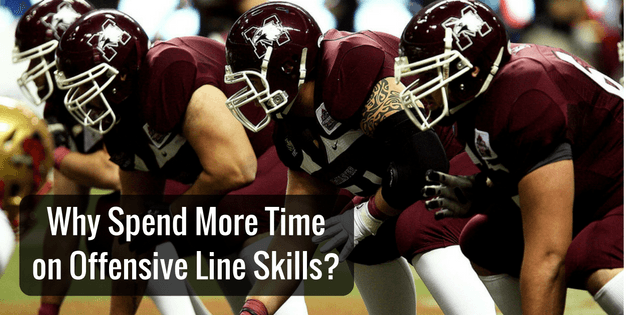
by Steve Stark | Oct 25, 2016 | coaching kids, youth football
Are there specific offensive line skills our kids should be learning?
Of course there are!
So why do coaches not spend the time to teach offensive line skills?
We have quarterbacks, running backs and receivers doing ball drills all year long.
The traditional “skill” players are now very heavily involved in 7 on 7 leagues and there are tons of camps designed for these positions.
What do we have the linemen do?
Lift.
While getting bigger and stronger is certainly important, there are actual position specific skills to focus on as well.
Linemen make up nearly half of the offensive team on the field.
Include a tight end, who should have these skills, and it’s more than half.
Yet we often spend the least amount of time developing offensive line skills.
We hit sleds, we hit each other, but we don’t work enough technique.
What are some of the skills offensive linemen can be working on?
4 Critical Offensive Line Skills
1. Stance
Is stance really a skill?
It is. And it’s quite possibly the most important skill for young linemen to learn.
Offensive line is the most unnatural position in sports.
Throwing, catching, kicking and running all involve very natural movements.
Getting into a stance is unnatural and takes a lot of time and repetition.
An offensive lineman’s stance is the foundation of their game.
Without a great stance, players are limited in their ability to make great plays.
2. Footwork
Speed is not a necessity in the offensive line.
However, agility is.
Once players perfect their stance they then need to be able to get out of that stance and attack.
Having fast feet will allow them to get into the proper position to make a block.
Keeping their foot in the ground is also important to maintain strength, leverage and balance.
All or which are needed to be a good offensive lineman.
3. Punch
Up front, football is about striking and maintaining blocks.
A player’s speed and strength with their punch helps them to create leverage.
Keeping tight hands is critical to having an effective and powerful punch.
Tight hands also keep referees’ flags in their pockets. (Because we NEVER hold… 😉 )
4. Pass Sets
We have a lot of coaches and players tell us they don’t really need to ever pass set.
Really?
If you want to have any chance to play at any college level then learn to pass set.
The technique will help your balance and lateral movement.
So even if you are in an offense that never uses a pass set, there is still a benefit to learning the techniques.
These are all skills that players can work on year round.
They may not be flashy but if a young player makes the time to put in the work it will pay off.
If you you found value with today’s post please like, comment and share.
Play Big!

Coach Steve











